
Hãy nhập câu hỏi của bạn vào đây, nếu là tài khoản VIP, bạn sẽ được ưu tiên trả lời.


Đáp án B.
Ta có 4 = 2 x + 2 y ≥ 2 2 x . 2 y = 2 2 x + y
⇔ 4 ≥ 2 x + y ⇔ x + y ≤ 2 .
Suy ra x y ≤ x + y 2 2 = 1
Khi đó
P = 2 x 3 + y 3 + 4 x 2 y 2 + 10 x y 2 x + y x + y 2 - 3 x y + 2 x y 2 + 10 x y
≤ 4 4 - 3 x y + 4 x 2 y 2 + 10 x y
= 16 + 2 x 2 y 2 + 2 x y x y - 1 ≤ 18
Vậy Pmax = 18 khi x = y = 1.

Đáp án C.
Ta có: GT
<=> 5x+2y + x + 2y – 3–x–2y = 5xy–1 – 31–xy + xy – 1.
X é t h à m s ố f t = 5 t + t - 3 - t
⇒ f t = 5 t ln 5 + 1 + 3 - t ln 3 > 0 ∀ t ∈ ℝ
Do đó hàm số đồng biến trên ℝ suy ra
f(x+2y) = f(xy – 1) <=> x+ 2y = xy – 1
⇔ x = 2 y + 1 y - 1 ⇒ T = 2 y + 1 y - 1 + y .
Do x > 0 => y > 1.
Ta có:
T = 2 + y + 3 y - 1 = 3 + y - 1 + 3 y - 1 ≥ 3 + 2 3 .

Ta có: \(x^2+2xy+7(x+y)+2y^2+10=0\)
<=> \((x^2+2xy+y^2)+7(x+y)+y^2+10=0\)
<=>(1)
Đặt t=x+y
=>(1)<=>\(y^2+t^2+7t+10=0
\)
Phương trình có nghiệm khi \(\Delta\)'\(\ge\)0
<=>\(t^2+7t+10=0
\) \(\le\)0
<=> -5\(\le\)t\(\le\)-2
=>Max S=1 khi t=-2<=>y=0;x=-2
Min S=-2 khi t=-5<=>y=0;x=-5

\(4=2^x+2^y\ge2\sqrt{2^{x+y}}\Rightarrow2^{x+y}\le4\Rightarrow x+y\le2\)
\(\Rightarrow xy\le1\)
\(P=4x^2y^2+2x^3+2y^3+10xy\)
\(P=4x^2y^2+10xy+2\left(x+y\right)\left[\left(x+y\right)^2-3xy\right]\)
\(P\le4x^2y^2+10xy+4\left(4-3xy\right)=4x^2y^2-2xy+16\)
Đặt \(xy=t\Rightarrow0< t\le1\)
Xét hàm \(f\left(t\right)=4t^2-2t+16\) trên \((0;1]\)
\(\Rightarrow...\)

\(4=2^x+2^y\ge2\sqrt{2^{x+y}}=2.2^{\frac{x+y}{2}}\)
\(\Rightarrow\frac{x+y}{2}\le1\Rightarrow x+y\le2\Rightarrow xy\le1\)
\(P=4x^2y^2+2x^3+2y^3+10xy\)
\(P=4x^2y^2+10xy+2\left(x+y\right)^3-6xy\left(x+y\right)\)
\(P=4x^2y^2-2xy+16=2\left(xy-1\right)\left(2xy+1\right)+18\)
Do \(xy\le1\Rightarrow2\left(xy-1\right)\left(2xy+1\right)\le0\Rightarrow P\le18\)
\(\Rightarrow P_{max}=18\) khi \(x=y=1\)

Do \(1\le x\le2\Rightarrow\left(x-1\right)\left(x-2\right)\le0\)
\(\Leftrightarrow x^2+2\le3x\)
Hoàn toàn tương tự ta có \(y^2+2\le3y\)
Do đó: \(P\ge\dfrac{x+2y}{3x+3y+3}+\dfrac{2x+y}{3x+3y+3}+\dfrac{1}{4\left(x+y-1\right)}\)
\(P\ge\dfrac{x+y}{x+y+1}+\dfrac{1}{4\left(x+y-1\right)}\)
Đặt \(a=x+y-1\Rightarrow1\le a\le3\)
\(\Rightarrow P\ge f\left(a\right)=\dfrac{a+1}{a+2}+\dfrac{1}{4a}\)
\(f'\left(a\right)=\dfrac{3a^2-4a-4}{4a^2\left(a+2\right)^2}=\dfrac{\left(a-2\right)\left(3a+2\right)}{4a^2\left(a+2\right)^2}=0\Rightarrow a=2\)
\(f\left(1\right)=\dfrac{11}{12}\) ; \(f\left(2\right)=\dfrac{7}{8}\) ; \(f\left(3\right)=\dfrac{53}{60}\)
\(\Rightarrow f\left(a\right)\ge\dfrac{7}{8}\Rightarrow P_{min}=\dfrac{7}{8}\) khi \(\left(x;y\right)=\left(1;2\right);\left(2;1\right)\)
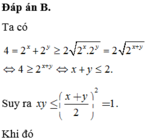


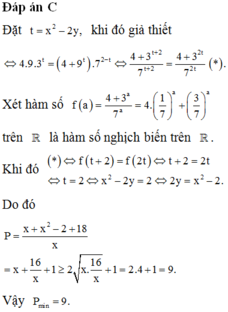
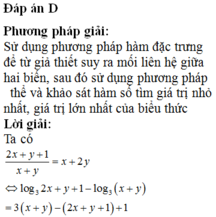
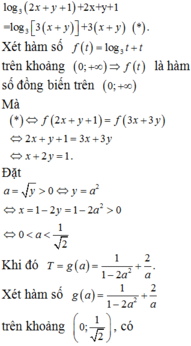

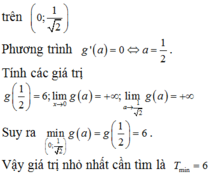
Lời giải:
Áp dụng BĐT Cauchy-Schwarz:
\((2x^2+3y^2)\left(\frac{1}{2}+\frac{4}{3}\right)\geq (x+2y)^2\)
\(\Leftrightarrow \frac{22}{3}\geq (x+2y)^2\Leftrightarrow x+2y\leq \sqrt{\frac{22}{3}}\)
Vậy \((x+2y)_{\max}=\sqrt{\frac{22}{3}}\)
Dấu bằng xảy ra khi \((x,y)=\left (\sqrt{\frac{6}{11}},4\sqrt{\frac{2}{33}}\right)\)
Cho 2 tập hợp A và B. Biết tập hợp B khác rỗng, số phần tử của tập B gấp đôi số phần tử của tập A∩B và A∪B có 10 phần tử. Hỏi tập A và B có bao nhiêu phần tử? Hãy xét các trường hợp xảy ra và dùng biểu đồ Ven minh họa?